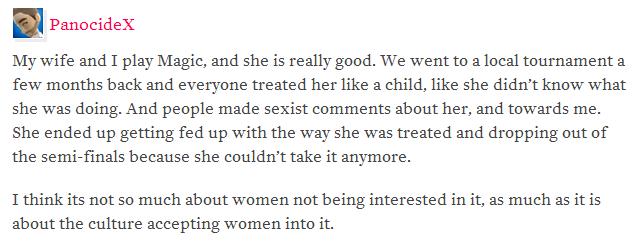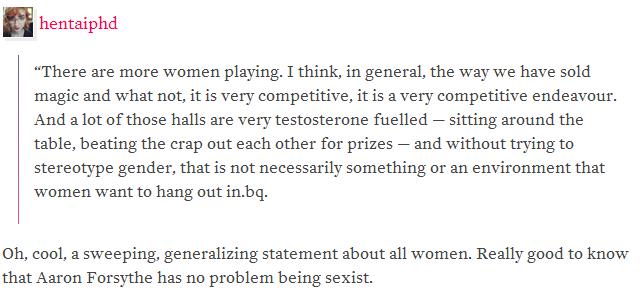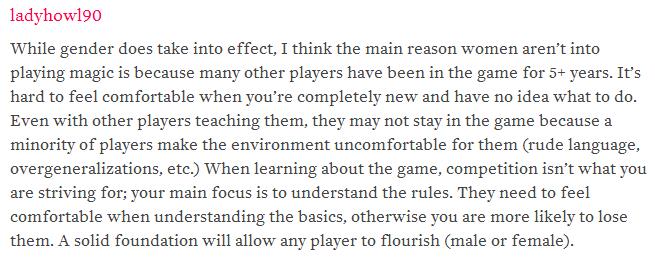Being a community is complicated.
During a recent panel at PAX Australia, our Commander in Chief Aaron Forsythe fielded a question regarding women in Magic.
The Question:
The Answer:
Queue the Comments:



A post goes live, and a link appears like a beacon in the night. Little link tentacles begin to reach out to Twitter, Reddit, and Facebook, and the discussions explode. The experts on everything with “studies” they found in their Google search bar begin dispensing knowledge justice.
Here come the trigger words: sexism, white knights, oversensitive, crybabies
The Backfire Effect is in full display, and nothing is really solved. Nothing changes.
I received several e-mails and more direct messages on Twitter from both men and women asking what I thought of Aaron’s comments. I too could respond with studies. I could become gleefully link-happy with study after study accounting how not only can women be just as competitive as men but when needed can display a viciousness unique unto ourselves. I mean, have you ever been to cheerleading tryouts? I could explain to you that law-enforcement agencies across the country are now recruiting women with intensity to combat toxic and brutal cop cultures. We can read studies together finding women are more likely to deploy empathy over ego, attempting to keep volatile situations from escalating. We could examine statistics by Fortune 500 companies showing there is a direct correlation between having a strong female role model and recruitment levels. I could. I’m not.
You Want to Know What I Thought of His Comments?
I thought he was surprised.
I thought he wasn’t prepared for the question.
I think answering a question of that complexity on a rapid-fire panel is an exercise in insanity.
Big Daddy Forsythe has continually displayed his intelligence, passion, and love for our game and community throughout his time at Wizards of the Coast. No one questions this. One of the consequences of focusing on why environments are not appealing or hospitable to the “gentler sex” (whether or not this assessment is true) is you can’t do it without out highlighting the worst aspects of your community. Which doesn’t just leave women thinking, “Yep, that doesn’t sound fun. Why waste my time doing that?” but leaves plenty men thinking this as well. There is an enormous part of the male population who wouldn’t find the environment described above all that enjoyable either. Answers with broad generalizations leave people feeling, “This is the way it always has been; this is the way it will always be. Nothing to be done about it.”
Do I think there are better ways Aaron could have answered this question? Yes. Do I think this answer makes him sexist? No. Do I think Aaron Forsythe’s thoughts regarding women in Magic and gaming are germane? No, not really. I do think yours are. Why do I think what you, Joben Anonymous, has to say on this topic is more important than the Big Daddy himself? Easy. You are Magic. You are the captains, lieutenants, and ground soldiers. You are the recruiters, trainers, and teachers. The gospel of Magic is spread through you—spread by grabbing your friends and saying, “Wow, look at this.” I think the real reason more women have not been attracted to Magic: The Gathering is you haven’t recruited them. Someone, somewhere, told you it was nerdy. Someone told you we wouldn’t like it—told you not to bother. So you haven’t. I don’t think it is because you are sexist. I don’t think it’s because you want to spend your time in a boys’ club. I don’t think you excluded women on purpose. I think you thought someone wouldn’t like a thing, so you wouldn’t inflict that thing upon her.
I began to notice when I wrote or read an article about women in Magic that there were comments like this popping up regularly:


There are many layers to this issue, but when you cut to the heart of the matter, I think we find a universal truth. There is a deeply ingrained human condition identified as fear of being new. New players are afraid of making mistakes—afraid of looking stupid. When you sit down at Friday Night Magic, you are sitting down against casual players and ringers alike. Playing someone who is new can be challenging for seasoned players. Newbies take too long, they miss their triggers, and they aren’t challenges. Someone thought that about you, too, once. Having an environment that is supportive of learning is the easiest way not just to attract women to the game but to attract all people to the game. Bigger events will turn into bigger prize payout, which will turn into more opportunities. Aaron Forsythe can make an awesome game for you to play, but only you can make an awesome environment to play in. That is why organizations such as the Lady Planeswalker Society are vital and brilliant. We need more branches popping up in LGSs across the world as safe havens and boot camps for newbies—a group to learn with—a group to grow with—a group you can make mistakes with.
My friend (and idol) Natasha Lewis Harrington was recently at San Diego Comic-Con teaching Magic: The Gathering to people who had never played before. I think we can all learn a little something from her experience:
”Learn to Play” by Natasha Lewis Harrington:
I didn’t set up my “Learn to Play” sign at San Diego Comic-Con with any kind of gender agenda. Honestly, I was just trying to entertain myself in between tasks for a very slow-moving event. But as soon as my sign was up, people started approaching me to the point that I often had to teach them two at a time—and out of the twenty-eight people I played with across two days, a full fifty percent were women. (A higher percentage if you only count new players—many of the men were alums.)
Many of them had partners or brothers or friends (male and female) who played, so clearly, the game had been available to them for who knows how long. Yet, somehow, it took a direct invitation—“Learn to Play”—to guide them past whatever barriers had held them back.
What made the program so appealing? There’s no way of knowing for sure, of course, but I believe there was one critical factor: normalization. We are a social species, and in unfamiliar situations, we look to the people around us to see what is expected. There are some intrepid (or foolish) people who then do what they want anyway, but for the most part, we use what we see to guide our own behavior.
To start with, it normalizes being a beginner. As Heather pointed out, learning to play is hard—you often feel incompetent and out of place until you find your footing. If you can’t be an expert, it may feel more comfortable to remain a spectator and avoid that awkward transition phase. A structured Learn to Play program provides a space where being a novice is expected and welcomed.
But more importantly, I think the program also normalized being a woman who wants to play, similar to the Lady Planeswalker Society. To start with, obviously, there’s me. And what’s more, I noticed that I would often begin teaching one woman and a second would approach us to join in.
Heather has identified a fascinating paradox: We love this game dearly—for many of us, it is our very favorite pastime—and yet, too many of us assume that women will see it as something that is being inflicted on them. In college, my then-boyfriend was berated by another player for “dragging” me to FNM, and more recently, someone even offered to have his wife give me a makeover while my husband played.
While I saw this as the well-intentioned nonsense it was, it would have been far too easy for me to internalize the idea that Magic is something I should want to escape from—something that men enjoy and women tolerate, which becomes a self-fulfilling prophecy. As Heather pointed out, this is a stereotype that we’ve all been exposed to, and it can affect how or even whether we approach potential new players. When we have a chance to introduce someone to the game, regardless of gender, I think it is important to assume that person is eager to learn until he or she indicates otherwise.
It is easy when discussing issues of communities, gender, and integration to feel a bit overwhelmed—to start thinking problems are too big to fix. This is one issue we do not need let claim us. This is one issue we can claim. Nothing spreads quicker than excitement and buzz. Excitement and buzz can’t happen without people first having fun. Fun can’t happen without you. It is up to you and me to be ambassadors of fun for the game we all love.























